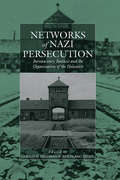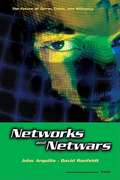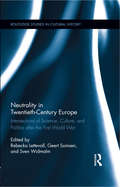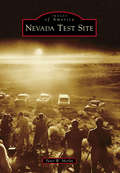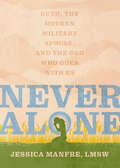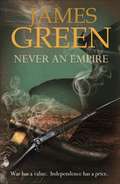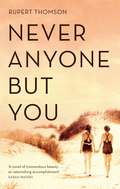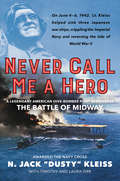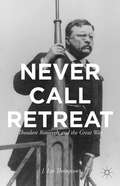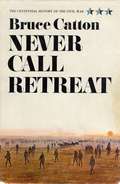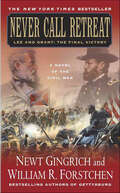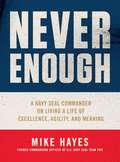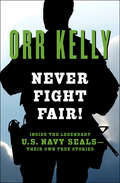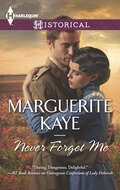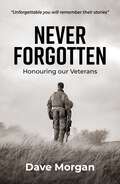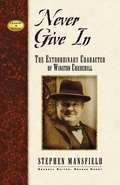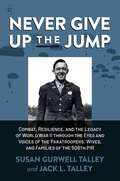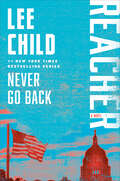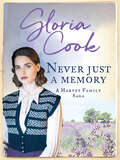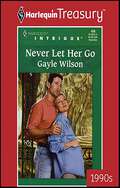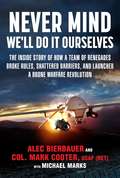- Table View
- List View
Networks Of Nazi Persecution
by Gerald D. FeldmanThe persecution and mass-murder of the Jews during World War II would not have been possible without the modern organization of division of labor. Moreover, the perpetrators were dependent on human and organizational resources they could not always control by hierarchy and coercion. Instead, the persecution of the Jews was based, to a large extent, on a web of inter-organizational relations encompassing a broad variety of non-hierarchical cooperation as well as rivalry and competition. Based on newly accessible government and corporate archives, this volume combines fresh evidence with an interpretation of the governance of persecution, presented by prominent historians and social scientists.
Networks and Netwars
by David Ronfeldt John ArquillaNetwar-like cyberwar-describes a new spectrum of conflict that is emerging in the wake of the information revolution. Netwar includes conflicts waged, on the one hand, by terrorists, criminals, gangs, and ethnic extremists; and by civil-society activists (such as cyber activists or WTO protestors) on the other. What distinguishes netwar is the networked organizational structure of its practitioners-with many groups actually being leaderless-and their quickness in coming together in swarming attacks. To confront this new type of conflict, it is crucial for governments, military, and law enforcement to begin networking themselves.
Neutrality in Twentieth-Century Europe: Intersections of Science, Culture, and Politics after the First World War (Routledge Studies in Cultural History)
by Geert Somsen Sven Widmalm Rebecka LettevallWhether in science or in international politics, neutrality has sometimes been promoted, not only as a viable political alternative but as a lofty ideal – in politics by nations proclaiming their peacefulness, in science as an underpinning of epistemology, in journalism and other intellectual pursuits as a foundation of a professional ethos. Time and again scientists and other intellectuals have claimed their endeavors to be neutral, elevated above the world of partisan conflict and power politics. This volume studies the resonances between neutrality in science and culture and neutrality in politics. By analyzing the activities of scientists, intellectuals, and politicians (sometimes overlapping categories) of mostly neutral nations in the First World War and after, it traces how an ideology of neutralism was developed that soon was embraced by international organizations. This book explores how the notion of neutrality has been used and how a neutralist discourse developed in history. None of the contributions take claims of neutrality at face value – some even show how they were made to advance partisan interests. The concept was typically clustered with notions, such as peace, internationalism, objectivity, rationality, and civilization. But its meaning was changeable – varying with professional, ideological, or national context. As such, Neutrality in Twentieth-Century Europe presents a different perspective on the century than the story of the great belligerent powers, and one in which science, culture, and politics are inextricably mixed.
Nevada Test Site
by Peter W. MerlinSince Pres. Harry Truman established the Nevada Test Site (NTS) in December 1950, it has played a vital role in the security of the United States. For four decades, the test site's primary purpose was developmental testing of nuclear explosives. Atmospheric tests conducted over Yucca Flat and Frenchman Flat between 1951 and 1962 involved thousands of Army troops and Marines simulating nuclear battlefield conditions. Civil defense planners studied blast and radiation effects and evaluated bomb shelter designs. Testing moved underground in 1963 to eliminate radioactive fallout. Other projects at the NTS included nuclear rocket engine development for space travel, training for NASA's Apollo astronauts, excavation experiments, radioactive waste storage studies, and aircraft testing. Since the last underground nuclear test in 1992, this geographically diverse testing and training complex north of Las Vegas--known since 2010 as the Nevada National Security Site--has been used to support nuclear stockpile stewardship and as a unique outdoor laboratory for government and industry research and development efforts.
Nevada Test Site (Images of America)
by Peter W. MerlinSince Pres. Harry Truman established the Nevada Test Site (NTS) in December 1950, it has played a vital role in the security of the United States. For four decades, the test site's primary purpose was developmental testing of nuclear explosives. Atmospheric tests conducted over Yucca Flat and Frenchman Flat between 1951 and 1962 involved thousands of Army troops and Marines simulating nuclear battlefield conditions. Civil defense planners studied blast and radiation effects and evaluated bomb shelter designs. Testing moved underground in 1963 to eliminate radioactive fallout. Other projects at the NTS included nuclear rocket engine development for space travel, training for NASA's Apollo astronauts, excavation experiments, radioactive waste storage studies, and aircraft testing. Since the last underground nuclear test in 1992, this geographically diverse testing and training complex north of Las Vegas--known since 2010 as the Nevada National Security Site--has been used to support nuclear stockpile stewardship and as a unique outdoor laboratory for government and industry research and development efforts.
Never Alone: Ruth, the Modern Military Spouse, and the God Who Goes With Us
by Jessica ManfreFaraway lands, fear, and faith—Ruth paves the way for our story.One day when author and military spouse Jessica Manfre was reading the book of Ruth, she had an epiphany. Ruth is the story of every military spouse. In the book of Ruth, we witness a woman&’s brave journey—one of loss, loneliness, and loyalty. A story of love and faith. Does that sound familiar? These are the hallmarks of the military life. While our lives are fraught with heartache and sacrifice, that isn&’t the whole of our stories. Ruth is a hero that has gone before us, offering encouragement and strength. Through her, we witness the beauty of hope and share in the healing power of friendship. We discover that even when all seems lost and completely hopeless, we are Never Alone. God is always with us. And He&’s leading us through our own story of redemption. He&’s restoring the hardships and healing the wounds of despair. He&’s transforming our pain and building our trust. Even when we&’re wandering in a faraway, foreign land, He is not lost and has not lost us.Join Jessica in studying a story that was meant for you. Jessica explores topics like the fundamental need for connection, the clinical mental health implications of loneliness, preparing your heart for loss (she writes from experience), friendship, and much more. This resource is for every military spouse who desires to strengthen relationships, live in authentic community, and walk with God.
Never An Empire: Agents of Independence Series (Agents Of Independence Ser. #4)
by James GreenAs the 19th century draws to a close America is at war – a circulation war! In New York the two great leaders of the Yellow Press, William Randolph Hearst and Joseph Pulitzer, have gone head to head and nothing sells papers like a real war. Such is the power of the press that they get one. American victory over Spain brings its prizes: Cuba, Puerto Rico, Guam, and the Philippines. But in the Philippines a rebel army is already fighting for independence, but the Land of the Free doesn’t want to grant them their wish …Fourth in James Green’s successful Agents of Independence series, tracing the development of the American Secret Service.
Never Anyone But You
by Rupert Thomson'A novel of tremendous beauty . . . A wonderful achievement' Sarah Waters'A beautiful and extraordinary book' Philip PullmanWhen Suzanne, a shy 17-year-old, meets the brilliant but troubled Lucie in rural Provence at the turn of the twentieth century, the two young women embark on a clandestine love affair. But they soon long for greater freedom. The lovers move to Paris where they recreate themselves entirely, as Claude Cahun and Marcel Moore. Before long, they are mixing in the most glamorous social circles and producing art of great power and strangeness.But the world is rapidly darkening around them. With war looming they leave Paris for Jersey, and it is here that they confront their destiny, dreaming up a campaign of propaganda against Hitler's occupying forces that will put their love - and even their very existence - in jeopardy. From one of our most celebrated writers, Never Anyone but You explores the gripping true story of two extraordinary women who smashed gender boundaries and ultimately risked their lives to overcome oppression. Theirs is a story that has been hidden in the margins of history - until now...
Never Call Me a Hero: A Legendary American Dive-Bomber Pilot Remembers the Battle of Midway
by Laura Orr Timothy Orr N. Jack KleissHailed as "the single most effective pilot at Midway" (World War II magazine), Dusty Kleiss struck and sank three Japanese warships at the Battle of Midway, including two aircraft carriers, helping turn the tide of the Second World War. This is his extraordinary memoir. NATIONAL BESTSELLER • "AN INSTANT CLASSIC" —Dallas Morning NewsOn the morning of June 4, 1942, high above the tiny Pacific atoll of Midway, Lt. (j.g.) "Dusty" Kleiss burst out of the clouds and piloted his SBD Dauntless into a near-vertical dive aimed at the heart of Japan’s Imperial Navy, which six months earlier had ruthlessly struck Pearl Harbor. The greatest naval battle in history raged around him, its outcome hanging in the balance as the U.S. desperately searched for its first major victory of the Second World War. Then, in a matter of seconds, Dusty Kleiss’s daring 20,000-foot dive helped forever alter the war’s trajectory. Plummeting through the air at 240 knots amid blistering anti-aircraft fire, the twenty-six-year-old pilot from USS Enterprise’s elite Scouting Squadron Six fixed on an invaluable target—the aircraft carrier Kaga, one of Japan’s most important capital ships. He released three bombs at the last possible instant, then desperately pulled out of his gut-wrenching 9-g dive. As his plane leveled out just above the roiling Pacific Ocean, Dusty’s perfectly placed bombs struck the carrier’s deck, and Kaga erupted into an inferno from which it would never recover. Arriving safely back at Enterprise, Dusty was met with heartbreaking news: his best friend was missing and presumed dead along with two dozen of their fellow naval aviators. Unbowed, Dusty returned to the air that same afternoon and, remarkably, would fatally strike another enemy carrier, Hiryu. Two days later, his deadeye aim contributed to the destruction of a third Japanese warship, the cruiser Mikuma, thereby making Dusty the only pilot from either side to land hits on three different ships, all of which sank—losses that crippled the once-fearsome Japanese fleet. By battle’s end, the humble young sailor from Kansas had earned his place in history—and yet he stayed silent for decades, living quietly with his children and his wife, Jean, whom he married less than a month after Midway. Now his extraordinary and long-awaited memoir, Never Call Me a Hero, tells the Navy Cross recipient’s full story for the first time, offering an unprecedentedly intimate look at the "the decisive contest for control of the Pacific in World War II" (New York Times)—and one man’s essential role in helping secure its outcome. Dusty worked on this book for years with naval historians Timothy and Laura Orr, aiming to publish Never Call Me a Hero for Midway’s seventy-fifth anniversary in June 2017. Sadly, as the book neared completion in 2016, Dusty Kleiss passed away at age 100, one of the last surviving dive-bomber pilots to have fought at Midway. And yet the publication of Never Call Me a Hero is a cause for celebration: these pages are Dusty’s remarkable legacy, providing a riveting eyewitness account of the Battle of Midway, and an inspiring testimony to the brave men who fought, died, and shaped history during those four extraordinary days in June, seventy-five years ago.
Never Call Retreat
by J. Lee ThompsonThe first modern account of Theodore Roosevelt and the First World War, this is a tale of war and politics as well as the private story of true love and family devotion: a story as multi-faceted as TR's own personality.
Never Call Retreat (The American Civil War Trilogy #3)
by Bruce Catton"A magnificent stylist . . . a first-rate historian. Familiarity with subject matter resulting from many years of study and narrative talents exceeding those of any other Civil War historian enable him to move along swiftly and smoothly and produce a story that is informative, dramatic, and absorbingly interesting." —Dr. Bell I. Wiley, after reading the manuscript of Never Call Retreat The final volume of Bruce Catton's monumental Centennial History of the Civil War traces the war from Fredericksburg through the succeeding grim and relentless campaigns to the Courthouse at Appomattox and the death of Lincoln. This is an eloquent study of the bitterest years of the war when death slashed the country with a brutality unparalleled in the history of the United States. Through the kaleidoscope tone and temper of the struggle, two men, different in stature, but similar in dedication to their awesome tasks, grappled with the burden of being leaders both in politics and war. In the north Lincoln remained resolute in the belief that a house divided against itself could not stand. His determination and uncanny vision of the destiny of the country and its people far transcended the plaguing tensions, fears, and frustrations of his cabinet and Congress. Mr. Lincoln’s use of vast resources is brilliantly contrasted to Davis’s valiant struggle for political and economic stability in a hopelessly fragmented and underdeveloped south. Though Davis never lacked for spirit and dedication, his handicaps were severe. This was not a war to be won by static ideals and romanticism. As Mr. Lincoln managed to expand and intensify the ideals that sustained the Northern war effort, Mr. Davis was never able to enlarge the South’s. This was a war to be won by flexibility in though, strength in supplies, and battles. And so they were fought––Fredericksburg, The Wilderness, Chancellorsville, Vicksburg, Gettysburg.
Never Call Retreat: Lee and Grant: The Final Victory, A Novel of the Civil War (The Gettysburg Trilogy #3)
by Newt Gingrich William R. ForstchenThe New York Times–bestselling alternative history of the Civil War reaches its thrilling climax in this “swiftly paced and authentically grounded novel” (Booklist).After his great victories at Gettysburg and Union Mills, General Robert E. Lee fails to attain final victory with his attack on Washington, D.C. But even as Union General Dan Sickles secures Washington, he and his valiant Army of the Potomac are trapped and destroyed. For Lincoln there is only one hope left: that General Ulysses S. Grant can save the Union cause.It is now August 22, 1863. Lee must conserve his remaining strength while maneuvering for the killing blow that will take Grant’s army out of the fight. Pursuing the remnants of the defeated Army of the Potomac up to the banks of the Susquehanna, Lee is caught off balance when news arrives that General Ulysses S. Grant, in command of more than seventy thousand men, has crossed that same river, a hundred miles to the northwest at Harrisburg.As General Grant brings his Army of the Susquehanna into Maryland, Robert E. Lee’s Army of Northern Virginia maneuvers for position. Grant first sends General George Armstrong Custer on a mad dash to block Lee’s path toward Frederick and with it control of the crucial B&O railroad. The two armies finally collide in Central Maryland, and a bloody week-long battle ensues along the banks of Monocacy Creek. This must be the “final” battle for both sides.
Never Enough: A Navy SEAL Commander on Living a Life of Excellence, Agility, and Meaning
by Mike HayesIn Never Enough, Mike Hayes—former Commander of SEAL Team TWO—helps readers apply high-stakes lessons about excellence, agility, and meaning across their personal and professional lives.Mike Hayes has lived a lifetime of once-in-a-lifetime experiences. He has been held at gunpoint and threatened with execution. He’s jumped out of a building rigged to explode, helped amputate a teammate’s leg, and made countless split-second life-and-death decisions. He’s written countless emails to his family, telling them how much he loves them, just in case those were the last words of his they’d ever read. Outside of the SEALs, he’s run meetings in the White House Situation Room, negotiated international arms treaties, and developed high-impact corporate strategies.Over his many years of leadership, he has always strived to be better, to contribute more, and to put others first. That’s what makes him an effective leader, and it’s the quality that he’s identified in all of the great leaders he’s encountered. That continual striving to lift those around him has filled Mike’s life with meaning and purpose, has made him secure in the knowledge that he brings his best to everything he does, and has made him someone others can rely on.In Never Enough, Mike Hayes recounts dramatic stories and offers battle- and boardroom-tested advice that will motivate readers to do work of value, live lives of purpose, and stretch themselves to reach their highest potential.
Never Fight Fair!: Inside the Legendary U.S. Navy SEALs—Their Own True Stories
by Orr KellyA riveting oral history of the US Navy SEALs—from World War II to Vietnam to Iraq—in the words of the warriors themselves&“It is better to die than to look bad or lose.&” —Capt. Ronald YeawThere is no more elite fighting force in the world than the esteemed US Navy SEALs. Famous for their rigorous training, fearlessness, and incomparable skills on sea, air, and land, these are the warriors who are routinely charged with carrying out the most dangerous combat assignments, always in secret and under cover of darkness. Much has been written about their remarkable achievements, from the earliest days of the World War II Underwater Demolition Teams through action in the Persian Gulf. But now these courageous men get to speak for themselves, telling their riveting war stories in their own words.Veteran military author Orr Kelly (Brave Men, Dark Water) has gathered together the stunning recollections of current and former SEALs to present a vivid and breathtaking picture of life and death among the best of the best in US Military Special Operations. These brave men speak openly about their training and their missions, offering the uncensored, inspiring, sometimes shocking truth about their combat triumphs and the rare but devastating failures. They carry the reader along with them on the path to glory and into the blistering heat of the fires of war.
Never Forget Me
by Marguerite KayeAS WAR BLAZES ACROSS EUROPE, THREE COUPLES FIND A LOVE THAT IS POWERFUL ENOUGH TO OVERCOME ALL THE ODDS... A KISS GOODBYE 1914 As war looms, genteel Flora yearns to be more than just an observer. She finds a revolutionary kindred spirit in soldier Geraint-but will their fragile love be crushed before it can start to bloom? DEAREST SYLVIE 1916 Soldier Robbie cannot forget his one hedonistic night in Paris with beautiful waitress Sylvie. But as Europe burns, can these two star-crossed lovers ever be reunited? FOREVER WITH ME 1918 Nurse Sheila is horrified to discover her new boss is the French surgeon she woke beside after Armistice Day! Fighting for their love will be the bravest thing she's ever had to do....
Never Forgotten: Honouring our Veterans
by Dave MorganIn the shadows of war, their voices resonate: Australian veterans' tales: Untold stories of Australia&’s forgotten soldiers. Vietnam Veteran Dave Morgan explores the often-overlooked sacrifices of Australian military personnel. Inspired by his own experiences, Dave embarks on a journey to capture the diverse narrative spanning generations and conflicts, from Vietnam to Somalia and Afghanistan. Through meticulous research and armchair conversations, he uncovers untold stories, from talented athletes like Ian Anderson to pioneering female veterans like Stephanie Shipman. The book weaves together tales of camaraderie and resilience, from heartwarming reunions to the loss of friends like Robert Wilson. These accounts offer a mosaic of bravery and resilience and through these stories, readers gain a deeper understanding of the profound impact of military service on individuals and communities, highlighting the importance of preserving these invaluable narratives. Never Forgotten serves as a poignant reminder of the sacrifices made by those who serve, ensuring their voices resonate for future generations. All proceeds from this book will be donated to Legacy Australia.
Never Give In: The Extraordinary Character of Winston Churchill
by Stephen MansfieldWinston Churchill was one of the most extraordinary leaders of the twentieth century. What was it that enabled him to stand so steadfastly when all those around him seemed to turn back in fear? What was it that enabled him to inspire whole nations to endure the unendurable and to achieve the unachievable when all those around him had already surrendered all hope? This remarkable new study of Churchill's leadership skill answers these questions and more. The result is an account that is as inspiring today as it was more than half a century ago when the great man' shadow fell large across the world stage. According to Henry Kissinger, Our age finds it difficult to come to grips with Churchill. The political leaders with whom we are familiar generally aspire to be superstars rather than heroes. The distinction is crucial. Superstars strive for approbation; heroes walk alone. Superstars crave consensus; heroes define themselves by the. . . future they see it as their risk to bring about. Superstars seek success in a technique for eliciting support; heroes pursue success as the outgrowth of their inner values. Winston Churchill was a hero.
Never Give Up the Jump: Combat, Resilience, and the Legacy of World War II through the Eyes and Voices of the Paratroopers, Wives, and Families of the 508th PIR
by Susan Gurwell Talley Jack L. TalleyThe daughter of a D-Day paratrooper and her husband, a PTSD therapist, discover a family legacy of love, trauma, and resilience when they set out to explore a vast trove of WWII correspondence, official military documents, personal effects, and unique militaria found in closets and basements after her father&’s death.Young Sue Gurwell had always known that her father had been a paratrooper. An old camo parachute from Holland served as her backyard tent, and high on a shelf she mustn&’t touch, eight red devils in parachutes grinned from the front of mysterious drinking glasses Dad had sent Mom during the war. And then there was the special poem in his roll-top desk she sometimes snuck a peek at, written by a member of Dad&’s regiment. This poem was a premonition of the sergeant&’s death. &“Yes,&” her dad told her, &“He was right—he died on D-Day.&” But it&’s not until 2016, after her parents had both passed away, that Susan Gurwell Talley and her husband Jack L. Talley begin to understand the true extent and significance of the wartime artifacts that had been staples of Sue&’s childhood. The Talley&’s discovered that Sue&’s father, Lt. George L. Gurwell, Executive Officer, HqHq, 508th PIR, had silently squirreled away thousands of wartime documents in the family home. Like most combat veterans, George was never one to talk about the war; but the historic collection of official records, correspondence, photographs, maps, memorabilia, cultural artifacts, and unique ephemera constitute quite possibly the most extensive, various, and complete documentation of the 508th held privately today. This precious resource could not have passed into better hands than those of Jack and Sue Talley. Jack, a PhD psychologist specializing in PTSD, was the first to understand that George had PTSD symptoms that still lingered from the war years when he and George were introduced on June 6, 2001. That evening, the 57th anniversary of D-Day, George first opened up about the war, and preceded to talk late into the night. In that conversation lies the genesis of this book.
Never Go Back: A Jack Reacher Novel (Jack Reacher #18)
by Lee Child#1 NEW YORK TIMES BESTSELLER • Never go back—but Jack Reacher does, and the past finally catches up with him. . . . Never Go Back is a novel of action-charged suspense starring &“one of the best thriller characters at work today&” (Newsweek). Don&’t miss the hit streaming series Reacher!Former military cop Jack Reacher makes it all the way from snowbound South Dakota to his destination in northeastern Virginia, near Washington, D.C.: the headquarters of his old unit, the 110th MP. The old stone building is the closest thing to a home he ever had.Reacher is there to meet—in person—the new commanding officer, Major Susan Turner, so far just a warm, intriguing voice on the phone.But it isn&’t Turner behind the CO&’s desk. And Reacher is hit with two pieces of shocking news, one with serious criminal consequences, and one too personal to even think about.When threatened, you can run or fight.Reacher fights, aiming to find Turner and clear his name, barely a step ahead of the army, and the FBI, and the D.C. Metro police, and four unidentified thugs.Combining an intricate puzzle of a plot and an exciting chase for truth and justice, Lee Child puts Reacher through his paces—and makes him question who he is, what he&’s done, and the very future of his untethered life on the open road.Don&’t miss Lee Child&’s short story &“High Heat&” in the back of the book.
Never Just a Memory (Harvey Family Sagas)
by Gloria CookTragedy and passion threaten to overwhelm the Harvey Family once again1944: War lashes the Harvey family. Emilia, now happily married to Perry Bosweld and expecting his child, worries about her son Will in the RAF, while Ben Harvey is horrified when he's suddenly faced with the daughter he’d turned his back on. When Emilia and Ben hurl painful truths at each other, Ben takes it badly, and disappears as a Special Operative Executive behind enemy lines in France. As the war puts lives in danger, secrets from the past continue to overwhelm the Harveys.But, as ever, new arrivals to Cornwall and fresh passions act as unpredictable catalysts in the family's chemistry… Never Just a Memory is the fourth novel in the engrossing Harvey Family Saga series, and is perfect for fans of Ellie Dean, Rosie Archer or Nancy Revell.
Never Let Go (A Blue Ridge Romance #3)
by Allison B. HansonJust one gorgeous weekend away from reality. Then they can go on like it never happened…Riley Fisher doesn't have time to chase after men. As a single mother working two jobs, she barely has time to eat or sleep. But a girl has needs. So when handsome veteran Sam Brooks asks her out, she decides she deserves some R&R. She doesn’t expect anything else from him—after all, he’s hardly the type to get serious.Sam came back from Afghanistan lucky to be alive, despite PTSD that hits whenever he lets down his guard. His therapist told him to forget about relationships. When he meets Riley, he’s not planning on breaking the rules. She’s cute, petite, and a total smartass—not even his type. But she’s hard to forget. Especially once he runs into Riley and her toddler on a rustic mountain getaway and sees what he’s missing. Her kid makes him laugh all day. And Riley makes him burn all night.Too bad a relationship is impossible. But they can enjoy the attraction. It’s not like they’re going to fall in love…
Never Let Her Go
by Gayle WilsonHe'd forgotten so muchUndercover agent Nick Deandro lost more than his vision when a shotgun blast shattered his life. Only he and the woman he loved knew the promises they'd just made: rings, babies, mortgages. Now he'd forgotten them all. Her name, her face...all but her touch.And he'd never known about the childAbby Sterling needed a rest. They promised her watching Nick would be just that-a safe job. But not for Abby. Because how could she protect Nick, stand close, when between them lay all that he'd forgotten? Every kiss. Every promise...and her growing secret.
Never Let The Meat Touch The Metal
by Robert CooperWhat makes a hero? Is it an individual who does things above and beyond the call of duty or is it someone who just keeps sticking his big fat nose into all the wrong places at the wrong time. Max is a young man in Poland who finds himself conscripted into the military prior to World War Two. His ability to speak a number of foreign languages and cook bring him to the attention of the High Command. A number of this elite group take a liking to him and he winds up learning things that most soldiers cannot even phantom, amongst them is the skills of a spy. When the war breaks out, Max uses these skills against the Germans; but in his travels, he discovers that they are not his only adversaries. Max begins to ask questions that no one wants to answer. In his quest to find these answers, he uncovers the true secrets of the war. The question then becomes who he can trust. Especially when it seems like everyone is trying to kill him to keep there dirty little secrets.
Never Mind, We'll Do It Ourselves: The Inside Story of How a Team of Renegades Broke Rules, Shattered Barriers, and Launched a Drone Warfare Revolution
by Bierbauer Alec Col. Mark Cooter Michael E. Marks&“An extraordinary, riveting, page-turning account—finally cleared for publication by the CIA—of the once highly classified effort by the CIA and special military units to develop a truly game-changing, transformational capability: armed drones."—General David Petraeus, US Army (Ret.), former Commander of the Surge in Iraq, US Central Command, and US and Coalition Forces in Afghanistan, and former Director of the CIAThe Inside Story of How a CIA Officer and an Air Force Officer Joined Forces to Develop America&’s Most Powerful Tool in the War on Terror. Never Mind, We&’ll Do It Ourselves is the story behind the origins of the Predator drone program and the dawn of unmanned warfare. A firsthand account told by an Air Force team leader and a CIA team leader, Never Mind, We&’ll Do It Ourselves takes readers into the back offices and secret government hangars where the robotic revolution went from a mad scientist idea to a pivotal part of global airpower. Featuring a foreword by Charlie Allen, an introduction by Lieutenant General John Campbell, USAF (Ret.), and an afterword by Lieutenant Colonel Gabe Brown, the story reveals the often conflicting perspectives between the defense and intelligence communities and puts the reader inside places like the CIA&’s counterterrorism center on the morning of 9/11. Through the eyes of the men and women who lived it, you will experience the hunt for Usama bin Laden and the evolution of a program from passive surveillance to the complex hunter-killers that hang above the battlespace like ghosts.Poised at the junction between The Right Stuff and The Bourne Identity, Never Mind, We&’ll Do It Ourselves documents the way a group of cowboys, rogues, and bandits broke rules and defied convention to change the shape of modern warfare
